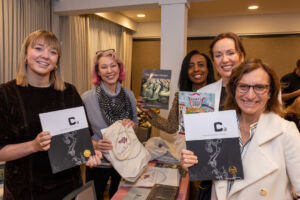When you’re excited about a brand new idea, it’s tempting to start writing immediately and get absorbed in your manuscript without pausing for days on end. Of course, that’s not a bad thing, but it’s important to reflect on what you’re doing, where that fits in the current literary scene, and what you want to achieve — and the best way to do that is to read other books in your genre.
Chances are, if you’re writing in a genre, you probably like it enough to read it too. The idea for your own book might have even come from reading another author’s book in that genre. But, just because you’re focused on writing your own book, that doesn’t mean that other books are irrelevant. There’s still lots to learn from them! If you’re on the fence about it, here’s 5 reasons why you should read other books in your genre.
1. Get inspired
Writing a book is a big project that can take months, and it’s easy to forget your passion for the genre when you’ve been staring at words on a page for too long. Luckily, reading other books in your genre can remind you why you fell in love with it in the first place. Is it the story’s atmosphere? The magic? The psychological insight? What is it about your genre that you can’t get enough of?
These things, big or small, can trigger inspiration like nothing else. Think back to that moment when you first decided you wanted to write books in your genre. Didn’t you have a book in your hands, or perhaps in your mind?
All you need to do to revisit that moment — that feeling — is to research works that interest you in the genre and treat it as part of your writing process. You might even want to reread some of your old favorites! After all, every writer will agree that we’re a lot more productive when we feel inspired, and many authors swear by reading as key to their productivity (particularly in the face of writer’s block). That said, make sure you don’t start accidentally slipping in eerily similar lines — you wouldn’t be the first!
2. Find unique angles
If you’re intending to sell your book and build a following, it’s essential that your story has a unique selling point. Of course, you don’t need to reinvent the wheel with every part of your story — in fact, some hallmark features of the genre are even expected, but more on that later — you just need something a little different to intrigue readers.
Whether they did it consciously or not, writers have been standing on the shoulders of giants for centuries. And while there might not be any completely original stories out there, it’s a writer’s bread and butter to develop their own unique angle on that which has already been done. That’s how genres came to be! It’s all about telling similar stories, through different lenses.
So, during your reading sessions, make sure to take note of any ideas that occur to you as you go. What do you think is missing from this story? Is there a nuanced direction that you wish it had taken, and can you use that angle to draw out a story of your own? You’ll find yourself building on the answers to these questions faster than you know.
3. Learn the conventions readers crave
You need to keep up with genre conventions – meaning story elements such as key events, settings, and character archetypes that you might only find in your genre – if you want to engage your target audience. Readers tend to pick a couple of genres to stick to because, while no one wants to read the same thing all the time, we expect (and look forward to) certain elements.
So, as a reader of your genre, what is it that you love about the books you read? Or, if that’s too broad a question, what do you miss when it’s not there? Don’t just read the books you love, or the classics of the genre that might have created the conventions themselves; read lesser-known books, recent releases, and even think about books you don’t love as much to figure out what’s missing from them for you.
For example, in a crime novel, would it feel the same if there wasn’t a suspect who had a secret history with the victim? Or if there wasn’t any semblance of a magic system in a fantasy story? Genres are a complex DNA structure, built out of hundreds of elements that readers have loved so much when put together that they’ve become inseparable. When you skip an essential element – particularly if there’s nothing filling the empty space – it can feel like the story doesn’t fulfill a promise, and the structure then collapses. So, when you pick up on common themes and elements during your reading, note down those which you deem as essential so you can refer to them later when you plan and write your book.
4. Determine which tropes work (and which don’t)
Tropes are a means of presenting genre conventions in a novel – and we can all agree that some really work, and some really don’t. While conventions are expected, and needed, within a genre, tropes are less of a necessity. You can subvert a trope to set your story apart with unique elements (and catch publishers’ eyes) or you can include a trope as a nod to the stories that came before yours. For example, while certain YA conventions might call for the protagonist to be a teenage outcast, that doesn’t mean they need to be moody or socially awkward — but that character archetype is a trope that often follows.
So, think about which tropes could work well in your story; if you throw in a trope or two, it’ll satisfy fans’ expectations and nostalgia, just watch that you don’t overuse them! That said, widely overused tropes can be a source of inspiration. A dangerously optimistic, yet well-meaning, teenage outcast protagonist is more likely to draw intrigue than their moody counterpart, in part because it subverts a trope. Or, if through your reading you come across numerous old and bedraggled mentor figures, why not make yours youthful beyond their years and unnervingly well-kempt? Understanding what’s expected and what you can subvert in your genre is key to writing a book readers will at least be fascinated by — and at best, absolutely love.
5. Examine marketing best practices
After plenty of reading around your genre, you’re bound to (and should) have more than a couple of the bestselling books on your shelf. Find the most recent bestsellers from the past couple of years and then dig into them.
It’s not just a matter of content and finding topics or themes that strike a chord with contemporary audiences, it’s also a matter of looking into the books’ presences online, how they look, and which platforms they appear on. In other words, you can glean how best to market a book in this genre. It’s easy to feel lost when you start this research, so here’s an idea of the key places examine:
- Cover designs:
Is there a popular style? Is a portrait plastered across each cover, or is the style more abstract? If there’s not an obvious style, watch out for recurring symbols; it might be that readers are drawn to covers that feature a certain item — for example, planets might be a recurring symbol in science fiction novels — regardless of how it’s presented.
- Length:
Is there an average page count? It’s pointless writing a book for a specific genre if the typical reader doesn’t have the time or stamina to finish it. Similarly, if readers crave endless twists and layered lore, they’ll probably be disappointed if the story wraps up in a hundred pages! - Themes:
Are there clear real-life thematic influences that seem prevalent throughout bestsellers in your genre? While I wouldn’t suggest you write a complex political allegory if it’s not something you’re passionate about, it’s good to get a feel for what readers are looking to get out of a novel. - Author media presence:
Where do the authors of bestsellers in your genre focus most of their marketing efforts? Look at the types of live events they do, and where they spend their time online. You can tell a lot about what readers want to see this way — and don’t forget to ask yourself what you want to see from the authors you read, too!
Now we’ve reached the end of the post, I hope this has convinced you that taking a little bit of time out to examine the inner workings of your genre can only be beneficial to your writing. If not, then remember that getting some time off to read can give your brain the rest it needs (and deserves) before you write again!
Rose Atkinson-Carter is a writer with Reedsy, a marketplace that connects authors hoping to get published with some of the world’s best editors, designers, marketers, ghostwriters, and translators. She lives in London.




